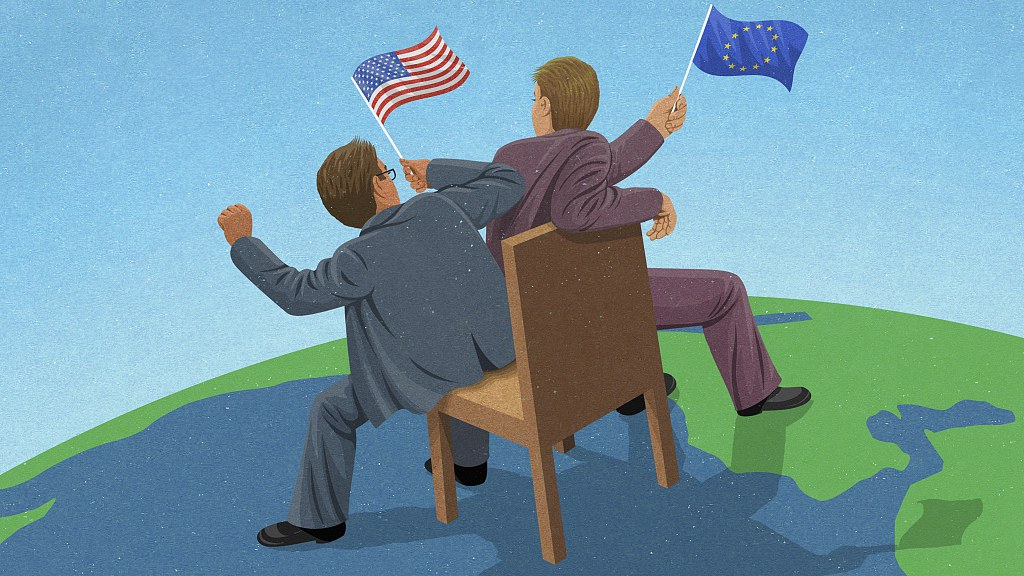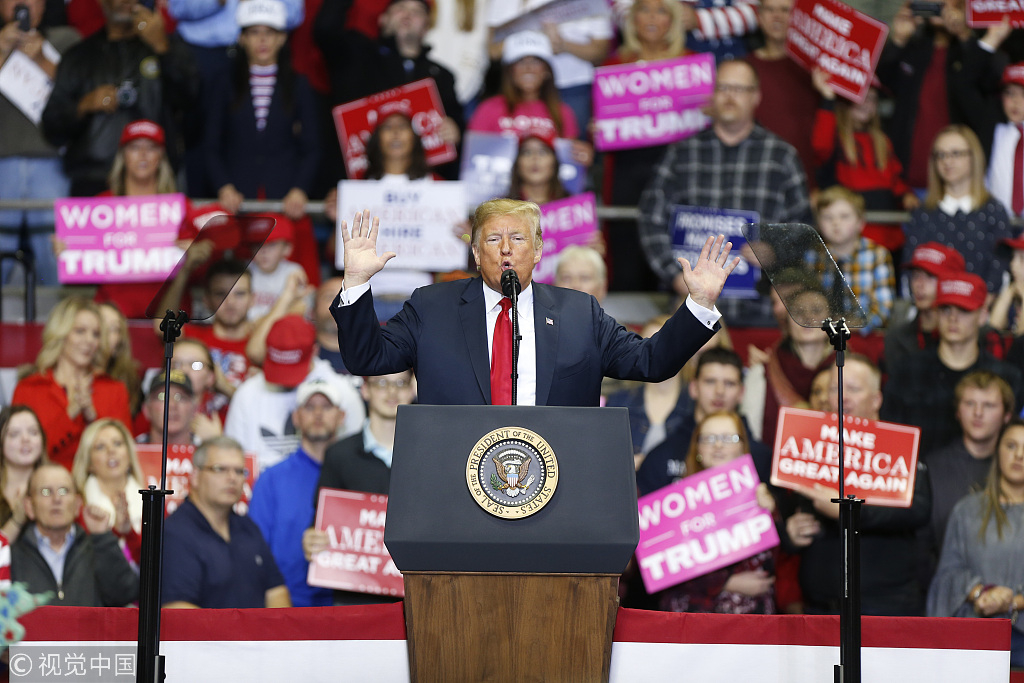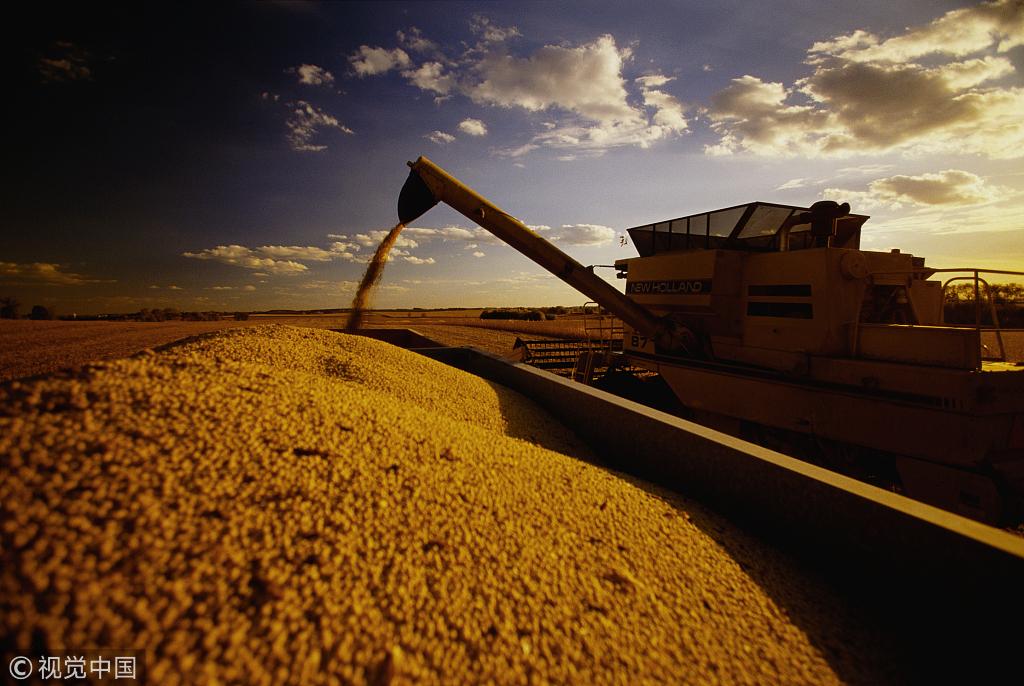
Analysis
16:11, 20-Feb-2019
Analysis: Trump's auto tariffs will cut off U.S.' nose to spite EU's face
Updated
12:14, 21-Feb-2019
Chu Xiaoji

This week, trade conflicts between the U.S. and the EU have escalated. On February 18, the EU warned it will retaliate swiftly if the U.S. imposes tariffs on imported vehicles from the EU. Last month, U.S. President Donald Trump threatened to impose tariffs of up to 25 percent on imported automobiles from the EU. In response, the EU vowed to impose tariffs on a total of 23-billion-U.S.-dollars' worth of American goods, including soybeans and liquefied gas.
"The trade war will cost American jobs and votes in a crucial swing state like Wisconsin when President Trump faces reelection in 2020," Tim Harcourt, a JW Nevile Fellow in Economics at the University of New South Wales and host of "The Airport Economist" on Sky News and Qantas, told CGTN.
Appeal to American voters
In the wake of the mid-term election last December, Trump's central preoccupation is the 2020 presidential election, Harcourt pointed out. In order to have "back-to-back" wins, he has to make preparations from now on. Harcourt believes that Trump's main priority is to appeal to the voters who sent him to the White House in 2016 and those who have the potential to vote for him next year.
In the last five years, there has been a global swing in politics, from supporting globalization to advocating protectionism. According to Harcourt, anti-globalization has become the mainstream of the world, and many people attribute the decline of the regional economy to globalization. The trade war launched by Trump and Brexit in the UK are the most obvious examples of the trend.

U.S. President Donald Trump campaigns for Indiana congressional candidates in Fort Wayne, Indiana, U.S., November 5, 2018. /VCG Photo
U.S. President Donald Trump campaigns for Indiana congressional candidates in Fort Wayne, Indiana, U.S., November 5, 2018. /VCG Photo
Back to America, Trump won the presidential election in 2016 due to his anti-globalization policies. Pushing his "America First" and "Make America Great Again" rhetoric, Trump successfully captured the public's attention.
"In order to win the election in 2020, Trump has to fulfill his promise in 2016: creating more job opportunities for common Americans," Shen Dingli, an American Studies professor at Shanghai-based Fudan University, told CGTN.
"Trump's main purpose is to make the EU knuckle under in an effort to bring benefits to American workers who are engaged in the automobile industry," Shen said, adding that economic matters are Trump's stock-in-trade.
In the trade war, everyone will lose
Both Shen and Harcourt hold firmly to the belief that Trump's trade policy is detrimental to not only America and the EU, but the whole world.
In Harcourt's opinion, the first casualty of the trade war with the EU will be Wisconsin, a crucial swing state where Trump performed well three years ago. Wisconsin's economy depends heavily on agriculture, but more specifically soybeans. Given the EU's threats to impose retaliatory tariffs on American soybeans, it will wreak havoc on Wisconsin's economy and cause unemployment.

Soybean harvest in Wisconsin. /VCG Photo
Soybean harvest in Wisconsin. /VCG Photo
"It would hurt Wisconsin, which is a key state in the 2020 presidential election," Harcourt said.
Apart from Wisconsin, the whole of America will be a victim once the trade war breaks out between the U.S. and the EU.
Dong Yifan, a research fellow at the China Institutes of Contemporary International Relations, pointed out that if the EU retaliates to U.S. auto tariffs by imposing tariffs on American soybeans, the U.S. economy will be damaged.
America's agriculture relies mainly on exports, and soybeans play a large role in that, Dong said. As the main importer of American soybeans, the EU would strike a serious blow to the U.S. economy by levying tariffs.
As two of the world's most influential economies, a trade war between the U.S. and EU would not be in the interest of ether side, and would be detrimental to the long-term stability of the world economy. These trade tactics will hamper the growth of the global economy and, in the long run, may cause a global economic recession.
"In my opinion, Trump's auto tariffs will cut off the U.S.' nose to spite the EU's face!" Shen said.
(If you want to contribute and have specific expertise, please contact us at opinions@cgtn.com.)

SITEMAP
Copyright © 2018 CGTN. Beijing ICP prepared NO.16065310-3
Copyright © 2018 CGTN. Beijing ICP prepared NO.16065310-3